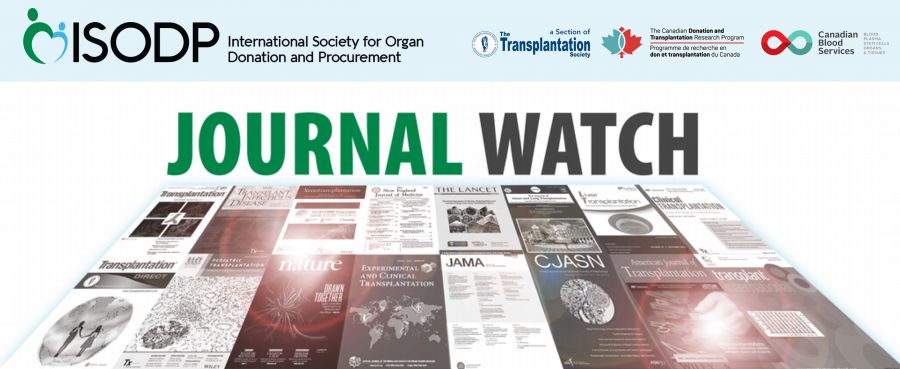Introduction
Welcome to the Canadian edition of the ISODP Journal Watch!While we have always included some Canadian content, we have also workedto represent the diversity of donation research happening around the world. This edition, however, has a distinctly Canadian flavour, and you should read it while imagining bright red maple leaves slowly swaying in a cool fall breeze and maple syrup for breakfast, lunch, and dinner!
The reason for this edition is the publication of two major Canadian-led best practice statements in the same week! The first is a major overhaul of the definition of death guidelines in Canada. While the main guideline documentis impressive in and of itself, the accompanying publications, all available as Open Access publications of the Canadian Journal of Anesthesia, represent an enormous amount of work by dozens of multi-disciplinary professionals who worked to summarize the existing literature informing the topics that were included in the guidelines. The result is the world’s most up-to-date examination of what death is, how it should be determined, and how best to communicate the concept of death to families.
The other Canadian-led best practice series is the output of the International Donation and Transplantation Legislative and Policy Forum. This Forum assembled 61 donation and transplantation stakeholders – from ODO administrative leads to patient partners – in the hope of creating general recommendations that jurisdictions around the world could apply to creating or improving a donation and transplantation system. The resulting seven manuscripts available Open Access from Transplantation Direct (with one more still underway!) cover a huge range of legal and policy issues that couldbe adapted to any local reality.
Finally, we included a scoping review of transplant outcomes from donations after medical assistance in dying (often referred to as voluntary euthanasia elsewhere) work that was co-authored by members of our Journal Watch team.
As a Canadian-led team, we are usually stereotypically humble and wary of self-promotion. This opportunity, however, was too much even for us. We truly believe these publications could be of use globally and are proud of the collaborative effort we led to creating this guidance in the field. All these publications include the input of patients and families with first-hand knowledge of the lived experience and experts from multiple fields working inconcert to craft the best recommendations possible.
We just hope your hands don’t get too sticky from the syrup while you’re reading them!
Sonny Dhanani
(Associate Director, CDTRP and Chair of the Canadian Donation Physician Network)
sdhanani@cheo.on.ca
Matthew Weiss
(Medical Director - Organ Donation at Transplant Québec and National Lead of the LEADDR Research Program, CDTRP)
matthew.weiss.med@ssss.gouv.qc.ca

Organ Donation Organization Architecture: Recommendations from an International Consensus Forum
Williment et al.
Transplantation Direct, May 2023
Corresponding author: Claire Williment - claire.williment@nhsbt.nhs.uk
Baseline Ethical Principles and a Framework for Evaluation of Policies: Recommendations From an International Consensus Forum
Gardiner et al.
Transplantation Direct, May 2023
Corresponding author: Dale Gardiner - dalegardiner@doctors.net.uk
These two articles from Williment and Gardiner respectively represent two of the seven recently published consensus documents created during an international hybrid forum (in person and virtual) on donation system laws and policy held in October 2021 in Montréal, Canada. The goal of the Forum was to create general recommendations that could be adapted to local realities for systems looking to develop or improve a donation and transplantation system. The document, led by Ms. Williment, represents a broad answer to a question that many people who control health care funds but do not work directly in donation may ask: What is an Organ Donation Organization (ODO)? By creating an overview of the various roles and responsibilities of an ODO, the hope is that funders and other stakeholders can understand the needs of an ODO and assure that the ODO has the resources to fulfill its many obligations.
The other manuscript was led by Dr. Gardiner and represents a model of how ODOs and other decisional bodies can evaluate the ethical ramifications of a proposed donation and transplant policy. In doing so, the team decided a new framework would be more useful for donation stakeholders than a simple recitation of existing ethical recommendations from various international bodies. The proposed framework includes clear steps on how to assess if a proposal – a change of the consent model, for instance – is consistent with the laws and values of the society it hopes to serve. The model is both novel and refreshing and will surely be useful to systems that hope to bring structure to their ethical evaluation of new policies.
For readers who would like to explore more of the Forum outputs, they are available for open access in the May edition of Transplantation Direct.

Outcomes from organ donation following medical assistance in dying: A scoping review
Silva e Silva, et al.
Transplantation Reviews, January 2023
Corresponding author: Vanessa Silva e Silva - vsilvaesilva@brocku.ca
This work led by Dr. Silva e Silva and funded by Canadian Blood Services used a scoping review methodology to investigate the potential outcomes of MAiD donors in Canada, Netherlands and Belgium (the three countries that allowed for this dual procedure at the time of the study). A total of 78 references were located that discussed various outcomes such as statistics and potential vs actual transplant outcomes. Organ donation following MAiD is still a relatively new procedure and therefore the impact of this practice on the transplant waiting list is small due to the rarity of the procedure. That review also located manuscripts (n=12) that discussed actual outcomes of transplants received from MAiD donors providing scanty evidence that organs retrieved from MAiD donors are associated with satisfactory graft function and survival rates. Overall, current evidence highlights that transplant outcomes from MAiD donors are similar to those from NDD donors and better than traditional DCD donors. However, this literature is still limited and despite the promise, further studies are required for comprehensive and reliable evidence.

A brain-based definition of death and criteria for its determination after arrest of circulation or neurologic function in Canada: a 2023 Clinical Practice Guideline
Shemie, et al.
Canadian Journal of Anesthesia, May 2023
Corresponding author: Sam Shemie - sam.shemie@mcgill.ca
Sam Shemie and colleagues have released a brain-based definition of death and criteria for death determination after the arrest of circulation or neurologic function in Canada along with 28 supporting manuscripts. This new Canadian clinical practice guideline defines death as the permanent cessation of brain function, which is characterized by the complete absence of any form of consciousness and the absence of brainstem reflexes, including the ability to breathe independently. Death can be determined using two categories of criteria – death determination by circulatory criteria and death determination by neurologic criteria. The criteria for death determination were developed by a multidisciplinary guideline development panel that included patient-family partners and the public, based on contemporary medical and legal understandings of the biological basis of death. The landmark clinical practice guideline will encourage uniformity, and improve clarity and confidence in death determination practices across Canada.

Implications of the updated Canadian Death Determination Guidelines for organ donation interventions that restore circulation after determination of death by circulatory criteria
Murphy, et al.
Canadian Journal of Anesthesia, May 2023
Corresponding author: Nicholas Murphy - nmurphy9@uwo.ca
This article led by Dr. Murphy provides a throughout discussion of the impact of the new guidelines for the determination of death. Particularly the new guidelines elucidate that post-mortem resumption of regional circulation followed by organ recovery does not violate the dead donor rule; since provided that brain function was permanently terminated at the time of death determination and provided that intracranial circulation is absent—post-mortem interventions restoring regional extracranial circulation may be acceptable. To further discuss the potential implication of that statement, the authors explore the ethical, scientific, and practical challenges of normothermic regional perfusion (NRP), tidal ventilation, uncontrolled DCD, as well as the need for future innovations that can restore circulation post-mortem in DCD.

Research and Innovation in Organ Donation: Recommendations From an International Consensus Forum
Escoto, et al.
Transplantation Direct, May 2023
Corresponding author: Mélanie Dieudé - Melanie.Dieude@umontreal.ca
This paper from Escoto and colleagues proposes recommendations and guidance regarding deceased organ and tissue donation research using the International Donation and Transplantation Legislative and Policy Forum. Although research for tissue and living organ donation is of significance, authors devised their recommendations on deceased organ donation due to its novelty and newly emerging role in the field. Narrative reviews were conducted by a diverse set of 12 team members comprising of transplant surgeons, physicians, researchers, patient partners and patient engagement leads. Using the nominal group technique, a consensus was reached to produce 16 recommendations for devising a robust deceased donor research framework stakeholders can use. Key areas of recommendations pertaining to donor, surrogate and recipient consent in the context of research ethics, patient donor family and public involvement in research, and data management. This is a novel and action-guiding study that sets the minimum ethical conditions for both donors and recipients, the key importance of patient partners and public involvement in research, and the need for both research and ethical oversight of organ donor research through modalities such as centralized institutional review board and oversight committees.
Contact
Address
The Transplantation Society
International Headquarters
740 Notre-Dame Ouest
Suite 1245
Montréal, QC, H3C 3X6
Canada

